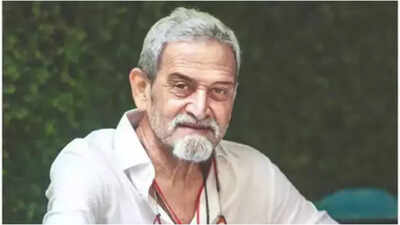- News
- entertainment
- hindi
- bollywood
- Mahesh Manjrekar reveals he drank two pegs of Bacardi before narrating 'Vaastav' script to Sanjay Dutt, who initially just ignored him
Trending
Mahesh Manjrekar reveals he drank two pegs of Bacardi before narrating 'Vaastav' script to Sanjay Dutt, who initially just ignored him
Mahesh Manjrekar's directorial debut, 'Vaastav', starring Sanjay Dutt, was a groundbreaking film amidst the underworld cinema era. Born from a spontaneous idea over rum, it faced production challenges but became a cult classic, praised for its gripping narrative and Dutt's performance.
Mahesh Manjrekar made his debut as a director with 'Vaastav', starring Sanjay Dutt, which is widely regarded as one of the best first films by an Indian filmmaker. It was created during the height of the 'underworld cinema' era, but it stood out due to its storytelling style, Dutt's performance, and the unforgettable ending that caught many off guard. Interestingly, it all began with two pegs of rum, a few swears, and Mahesh's unwavering determination.
The filmmaker shared with Pinkvilla the story behind 'Vaastav', explaining that he met Sanjay Dutt without a written script. He said, "Before meeting him, I went to a restaurant, ordered two pegs of Bacardi, borrowed the waiter’s notepad, and started writing pointers." He managed to jot down about 25 scenes as one-liners, relying on the script already formed in his mind. This initial meeting occurred on the sets of 'Dushman'.
Sanjay's back was initially turned to him, and he was accompanied by Sanjay Chhel. Chhel's father was the production designer for the film, and he waved at Mahesh. When Sanjay Dutt turned around, he gave Mahesh an incredulous look that seemed to say, "What is he doing here?" Mahesh believes that Sanjay then turned back and started using expletives while speaking to Chhel, although he couldn't hear the exact words. He inferred this from Chhel's expressions. At the time, no one knew Mahesh, no one offered him a seat, and it was his first experience on such a large film set.
Manjrekar stayed on the sets, knowing he wouldn't be called back if he left. Dutt initially ignored him but eventually asked to hear his narration, which lasted about 1.5 hours. Sanjay was impressed and helped find a producer for 'Vaastav'. However, production faced challenges, including financial issues and Sanjay's court appearances, which required nighttime shoots. The film was nearly shelved due to these delays.

About the Author
TOI Entertainment DeskEnd of Article
FOLLOW US ON SOCIAL MEDIA
Visual Stories
Tired of too many ads?






